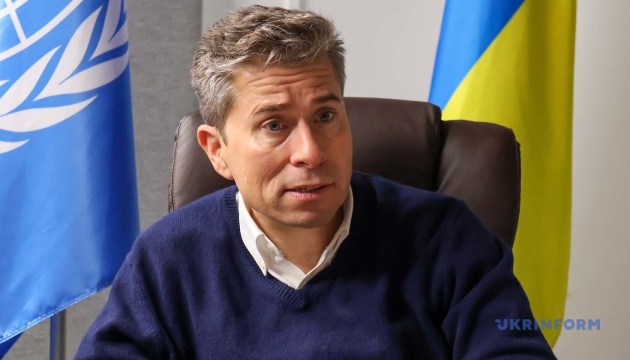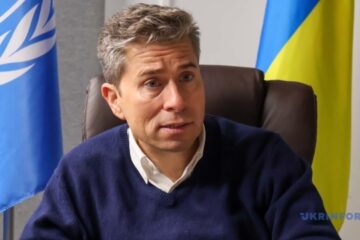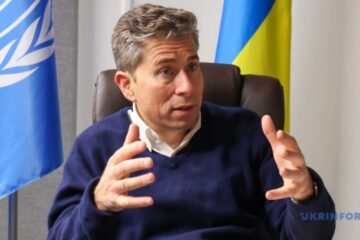“We need to look five to ten years ahead, no matter how long it takes Ukraine to rebuild,” said UN Under-Secretary-General Tom Fletcher, appointed in November to be responsible for humanitarian support. He assures that his organization will not leave Ukraine and will help as long as necessary.
These are encouraging words for Ukrainians while the largest humanitarian network in the world is being stretched between numerous conflicts.
Meanwhile, Mr. Fletcher says that he continues to talk to the Russians in the (un)hope of achieving assistance to Ukrainians. He does not stop convincing those who, in his words, attack humanitarian workers and civilian infrastructure.
That is the impression from an interview with Ukrinform by UN Under-Secretary-General for Humanitarian Affairs Tom Fletcher. We spoke with him last week, during his first visit to Ukraine in Kyiv, immediately after his trip to the east.
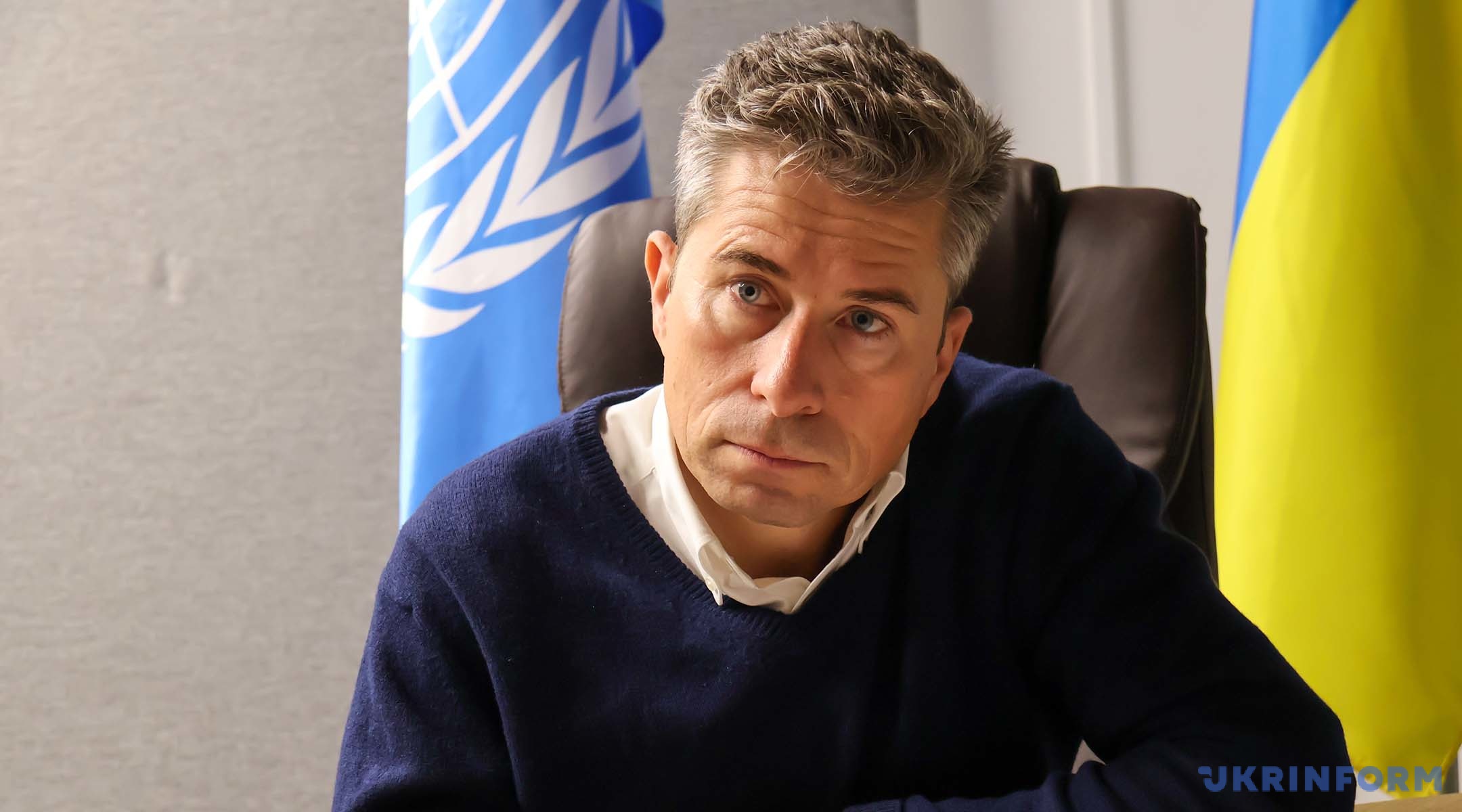
THE NGOs TOLD ME ABOUT RUSSIAN ATTACKS AGAINST THEM
— Mr. Under-Secretary-General, this is your first visit to Ukraine since you took office in November. You came to announce a new humanitarian response plan for 2025. What will this plan be about, and what are the other goals during your visit?
— You are right, it is my first visit to Ukraine on the job and my third major visit, having done Sudan and Syria. My main job here is to listen to the Ukrainian people and learn about the support they need. I went east and visited Zaporizhzhia and Dnipro, Pavlograd, Pokrovsk, Shevchenkove, Kupiansk, and Kharkiv, before coming back to Kyiv.
At all those places, I have been stopping, asking questions, listening, learning, and meeting the local governance — three governors in the east — to see how we can work with the Ukrainian authorities as well.
We launched our road map for 2025 on January 16, where we set out our objectives. Globally, the UN is asking for $47 billion to reach 990 million people across 72 countries. Ukraine is a massive part of that.
It is a tough environment right now to raise money. That is why I am here to tell the world the war is going on. The Ukrainian people have continued to absorb this conflict with great resilience, but has not stopped. I have experienced that today and seen the strikes on the front lines.
Therefore, we must be here on the side of the Ukrainian people, delivering that humanitarian response. Then, we must try to raise between two and three billion dollars to reach the six million people most affected.
— What is your major takeaway from the discussions with local officials and Kyiv?
— The needs are still very great. I heard from people close to the frontline that they needed shelter, food, help with unexploded munitions or finding the key documents, and schools, particularly underground ones, medical relief, and hygiene packs. So, there is a lot we can do for people escaping the war and on the move. We had to help people on the move but also help those who stayed.
According to the authorities, there are big challenges because of the attacks on civilian infrastructure. They want to keep the power and the gas on. We must look at those needs as well.
I coordinate UN relief and ensure all our agencies are working together coherently and strategically. I also make sure that we are working with our local partners. And it is very striking here in Ukraine. We have a mature partnership with local NGOs. They deliver a lot for the humanitarian movement and the Ukrainian people. They are the front-line responders.
You must not forget that there have been attacks by Russian armed forces. I do not have numbers, but one of the NGOs in the field told me about that challenge. One showed me a vehicle with a smashed window where a drone had hit. Others talked about the challenge of delivering aid while the bombs are falling.
That is why people often talk about the military as heroes. But in my world of humanitarianism, it is the humanitarians who are the greatest heroes. They are the people who go towards the sound of war to help those who are escaping the conflict. Ukraine’s humanitarian workers demonstrate amazing courage and professionalism. The world and Ukraine should be proud of them.
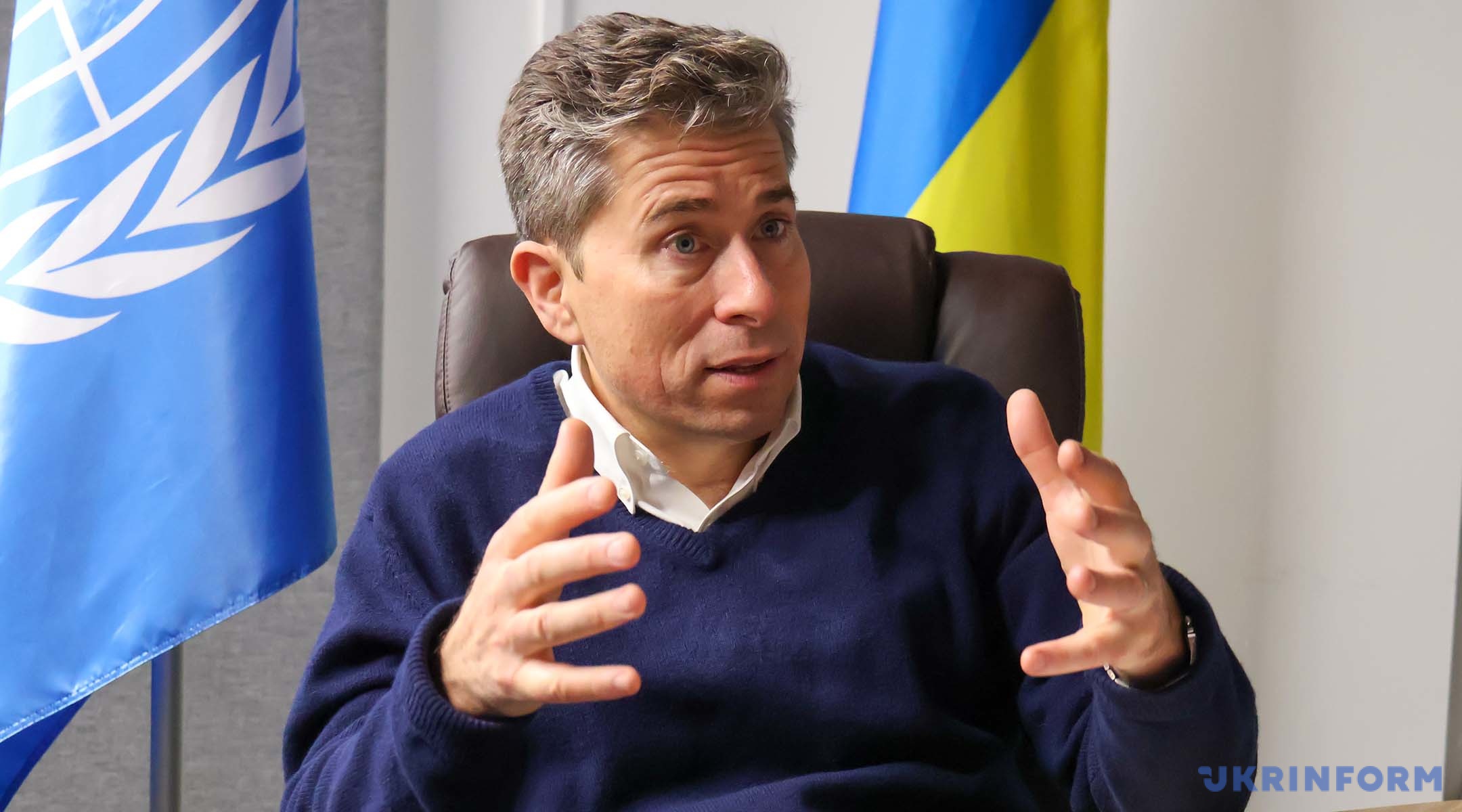
WE WON’T LEAVE BECAUSE OF A PAUSE IN THE WAR
— All of the previous local UN coordinators emphasized that, over time, it is harder to receive funds from donors for Ukraine. And since President Trump promised to end the war, everyone has focused on the truce or freezing the battles. The obliterated cities, the refugees or people in need will not vanish into the thin air. However, many donors will be more reluctant to help. Will we be able to rely on your support in these conditions?
— Absolutely. That is why I am here and my amazing colleague, Filippo Grandi, is also here to launch this 2025 plan.
There is a risk that donors feel stretched and exhausted because we are dealing with so many crises at the moment, including Gaza, Syria, Sudan, Yemen and many others. We need to continue that sense of compassion for those who are suffering from war, poverty, and health crises. That applies here in Ukraine as much as everywhere else. And we must sustain that support.
— In early December, the Ukrainian government created the Ministry of National Unity to preserve connections with our diaspora. Have you considered — or have already started — cooperating with this national body in terms of helping Ukrainian refugees abroad?
— We have incredibly close working relationships with the Ukrainian authorities in the regions and at the centre. I meet a whole range of government interlocutors, including the President, to reinforce that cooperation. This is one of the strongest partnerships I have seen anywhere. We must work with all the different parts of the Ukrainian system.
— I also want to ask you about the UN Food Programme’s cooperation because even while fighting, we help other countries through Grain from Ukraine. So, according to your assessment, how does it impact people in Asia and Africa? Will the UN and Ukraine expand this project in Syria, where we have sent 500 tons of grain?
— It is very clear that although Ukraine has been a recipient of support, it is also a big donor. Over time — and I do not know what will happen in 2025, I do not have any particular insight on what may change with President Trump’s election — whatever happens, the needs will change, and we will have to adapt to that. But also, I think we need to look at five or ten years ahead — however long it will take for the country to rebuild and to prepare for its future.
I think, at that period, we will see Ukraine playing even more of a role as not just an importer of humanitarian support but as an exporter. The local NGOs have built up such expertise and capacity through this crisis that they will be on the humanitarian front lines globally in the future. I think Ukraine will be a humanitarian superpower.
— Five-ten years? Is it only about humanitarian assistance or more about rebuilding?
— At this stage, we do not know the future needs. What is clear is that we will not leave just because of a pause in the war. The humanitarian needs will still be great. They will shift, there will be work on unexploded munitions, work at the right moment to help people return to their homes. There will be huge amounts of work to rebuild the country, get the essential civilian infrastructure back up and running, and get people’s lives back to normal.
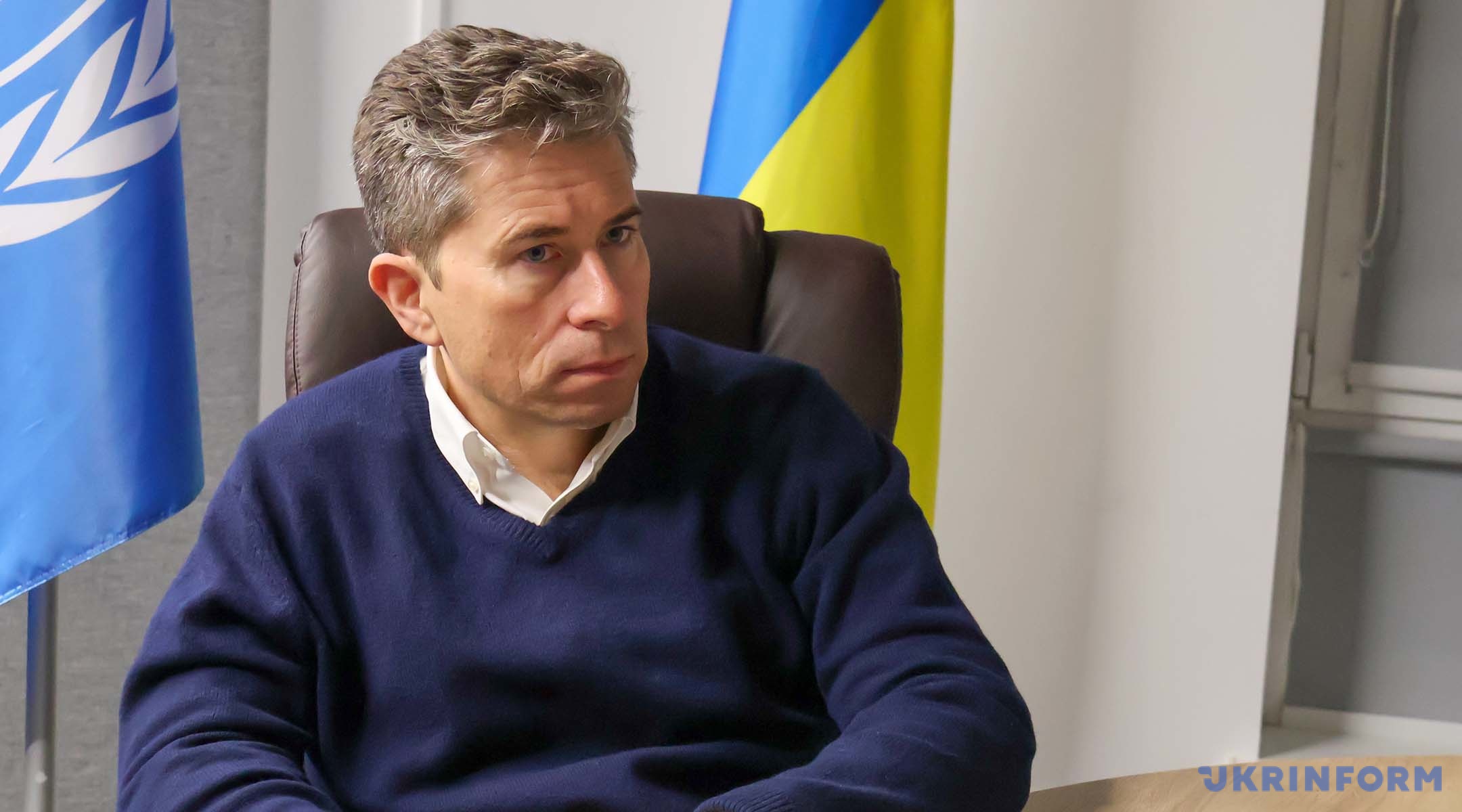
WE SHOULD BE REALISTIC ABOUT A DIALOGUE WITH RUSSIA, BUT WE ALWAYS HAVE TO TRY
— Secretary-General António Guterres went to the BRICS summit in Russia in October 2024. Putin exploited this place to share his false excuses for his brutal and unjustified aggression while the UN Secretary-General was there. What do you think about this? Did your chief’s decision undermine trust in the organisation as a whole?
— It is the role of the United Nations to be neutral and impartial, to speak to everyone. My job is to go anywhere and talk to anyone to get humanitarian aid through. That goes for the Secretary-General as well. He has a dialogue with everyone.
Russia is a permanent member of the Security Council. It has a role in many dossiers that we work on. That is why he has a dialogue with the Russian government, as well as every other government.
— But Ukrainians were upset about his visit. They did not see any dialogue or improvement when he was there.
— I think we should all be realistic about the extent to which a dialogue with Russia will shift their position.
But as diplomats, mediators and people who believe in stopping wars, we always have to be trying. We have to be optimistic and do our best, even if we are realistic about how hard it is and how unlikely we will get anywhere.
— Russia has denied the UN missions from entering the occupying territories of Ukraine. Madame Denise Brown [the UN Resident Coordinator in Ukraine] used to say they sent letters to Ukraine, and it agreed to provide the corridor, while Russia said no. It has been so for three years. Do you see the way to reach those Ukrainians under Russian occupation?
— It is very hard. But as humanitarians, our mission is to help anyone anywhere who needs our help, wherever they are. That is difficult when the war is raging, but ultimately, we have to find ways to reach them. That will always be part of my hope and my aspiration in this role to reach those affected by the war wherever they are.
— You have been in the office since November. Have you tried to meet with any Russian representative? What did they tell you about not allowing your missions in the occupied territories of Ukraine?
— I have a regular dialogue with the Russian embassy and the Russian mission in New York as a permanent member of the Security Council. I am talking to them about a whole range of things. My persistent message is that we have to reach everyone everywhere.
I cannot go into all the details of all the discussions because they are confidential. But this is a large part of my mission globally. Those conversations are often difficult. It takes time to get results, but I am determined to make that progress during my time as the USG.
Ivan Kosiakin, Kyiv

